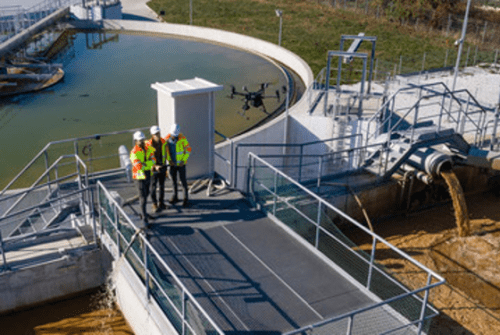Industrial Wastewater Treatment Solutions

Companies rely on industrial wastewater solutions, like the removal of oil and grease, brine, solids, and more, to comply with environmental regulations. The benefits of wastewater treatment, however, go beyond simply staying compliant. Proper treatment contributes to healthier communities, water conservation, and more.
Benefits of Wastewater Treatment
Why do we treat wastewater? There are both long- and short-term benefits, as wastewater treatment:
- Conserves water
- Reduces water pollution
- Prevents waterborne diseases from spreading
- Saves money by avoiding costly fines and other non-compliance penalties
- Recovers reusable methane during sludge treatment, which can act as a natural fertilizer
- Helps reduce the greenhouse effect
Industrial Wastewater Treatment Process & Solutions
Wastewater contains a variety of contaminants, depending on the water’s function. In the steel and iron industry, for example, ammonia, cyanide, tallow, and oils can contaminate water; meanwhile, in the meat processing industry, wastewater is likely to contain antibiotics and organic material like blood. There are different wastewater treatment options to remove specific contaminants:
- Solids. Typically, treatment systems remove solid particles through sedimentation—simply letting the heavier solids sink to the bottom of the water. When the solids are very fine or closely match the density of water, this may necessitate additional refined filtration techniques.
- Oil and grease. Through the force of gravity and an API oil-water separator, systems can skim the oil and any suspended solids from the surface of water. While sediment pulls to the bottom of the water, oils and grease float to the top. The cleaner water in between continues to pass through the system, receiving additional treatment to remove any remaining oil or grease residue.
- Biodegradable organics. The activated sludge process uses air and microorganisms to oxidize organic contaminants. The result is a sludge that treatment systems can remove from the water. This biochemical process is useful for treating industrial wastewater as well as sewage.
- Acids and alkalis. Treatment systems can carefully neutralize acids and alkalis, though the process produces a solid precipitate that secondary treatment systems are responsible for removing. As this residue can be toxic, specialists must carefully control these processes and dispose of the waste material appropriately.
- Brine. Some wastewater has a particularly high salt content, causing corrosion. A desalinization process takes dissolved sodium ions from any existing salt and generates residual solids or concentrated brine. To fully clear wastewater of its metals and calcium ions, it may need additional treatments.
Applications
Reynolds Culligan treats wastewater in a variety of industries and applications:
- Municipal. Municipal water has residential, public, commercial, and industrial applications in a community. Treating the water to remove dangerous contaminants keeps people healthy while increasing water conservation for cost savings.
- Mining. Mining operations have to meet strict environmental regulations. Wastewater treatment helps ensure compliance by removing metal contaminants like arsenic and zinc, saves the mining company money, and conserves water for the region.
- Iron and steel. This industry uses water extensively for cooling. By treating the wastewater, it prevents contaminants like oils, cyanide, and cresols from entering the water supply.
- Food and beverage. This industry uses substantial amounts of water to sanitize and prepare food products for sale. The wastewater may contain organic solids, antibiotics, and growth hormones that treatments must remove before water repurposing.
- Complex organic chemicals. The wastewater from pharmaceutical companies, paint manufacturers, and pesticide producers can contain a variety of cleaning agents, plasticizers, and solvents. These pose health and environmental hazards if the wastewater is not properly treated.
- Oil and gas. The waste from oil and gas as well as water used for cleaning tanks and other equipment require wastewater treatment. This treatment helps ensure safe operations while helping these companies control costs and meet disposal regulations.
- Pulp and paper. Paper production requires a tremendous amount of water for bleaching procedures. The resulting wastewater may contain harmful substances, such as chlorine, hydrocarbons, and phenols, that could potentially cause physiological damage.
Industrial Wastewater Treatment From Reynolds Culligan
Wastewater treatment is about environmental protection, regulatory compliance, health, safety, and your bottom line. Since our founding in 1948, Reynolds Culligan has provided trusted, superior water treatment for the industrial sector. We serve as a single source for all your water filtration and purification needs, including water softening, deionization, UV treatments, and reverse osmosis techniques.
Our knowledgeable staff is here to help. Click here to get a free estimate.
Call or fill out our contact form for more information!


